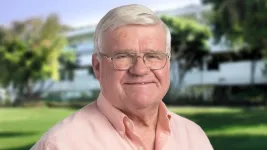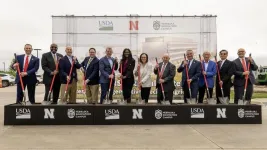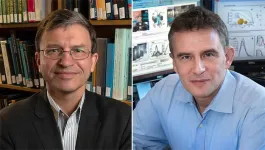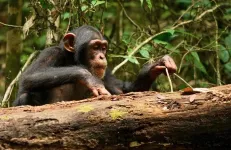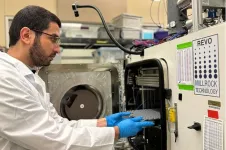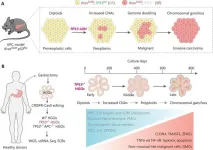(Press-News.org) LA JOLLA, CA—Scripps Research professor emeritus John Johnson, PhD, has been elected to the National Academy of Sciences—one of the highest honors given to scientists. According to the Academy, members are selected “in recognition of their distinguished and continuing achievements in original research.”
“Becoming a member of the Academy is a great honor for me and the 70 graduate students and post docs that have worked in my lab since 1978, as well as numerous collaborators at Scripps and around the world,” says Johnson, who is also the Eldon R. Strahm Professor of Structural Virology in the Department of Integrative Structural and Computational Biology. “The organization shares my commitment to helping the world through science.”
Johnson earned his doctorate in physical and inorganic chemistry from Iowa State University in 1972 and spent 23 years at Purdue University before moving to The Scripps Research Institute (now known as Scripps Research) in 1995. His lab investigates a range of viruses—including those that infect bacteria, insects and plants—and he has published several related studies. Much of his work used X-ray crystallography and, more recently, electron cryomicroscopy to solve the structures of intact complex virus particles.
During his tenure, Johnson published the first reports of icosahedral virus particles as building blocks for organic chemistry, bridging the field of chemistry with biology. And while combining chemistry with molecular genetics, he found a way to attach a range of molecules to the surface of a virus, thereby imbuing the virus with the properties of those molecules. This method is applicable to several scientific fields, including materials science, medicine and molecular electronics. It can be used to immobilize large molecules—and even whole proteins—on the surface of a virus. Even more, the technique was applied to build a circuit on the surface of a virus employing chemical “nanowires.” His lab also generated the first atomic models of an insect virus, a dsDNA bacteriophage and an archaeal virus that lives in the hot springs of Yellowstone National Park.
For his contributions to science, Johnson has been awarded the Distinguished Scientist Award by the American Chemical Society-San Diego. Johnson also served as a member of the Board of Scientific Counselors for the National Cancer Institute as well as the National Institute of Arthritis and Musculoskeletal and Skin Diseases, and on the council of the National Institute of General Medical Sciences In addition, he served on the editorial boards of several peer-reviewed journals, including the Journal of General Virology, the Journal of Molecular Biology, the Journal of Molecular Recognition, Structure and Virology.
Established by an Act of Congress that was signed into law by President Abraham Lincoln, the National Academy of Sciences has been in existence since 1863. As advisors to the nation, Academy members are required to provide scientific guidance to any US government body “whenever called upon.”
With the election of Johnson, Scripps Research faculty now hold 30 memberships in the National Academies of Sciences, Medicine and Engineering.
To view a full list of members elected in 2024, visit the National Academy of Sciences website.
About Scripps Research
Scripps Research is an independent, nonprofit biomedical institute ranked one of the most influential in the world for its impact on innovation by Nature Index. We are advancing human health through profound discoveries that address pressing medical concerns around the globe. Our drug discovery and development division, Calibr, works hand-in-hand with scientists across disciplines to bring new medicines to patients as quickly and efficiently as possible, while teams at Scripps Research Translational Institute harness genomics, digital medicine and cutting-edge informatics to understand individual health and render more effective healthcare. Scripps Research also trains the next generation of leading scientists at our Skaggs Graduate School, consistently named among the top 10 US programs for chemistry and biological sciences. Learn more at www.scripps.edu.
END
Professor emeritus John (Jack) Johnson elected to the National Academy of Sciences
Johnson’s multi-disciplinary research has been instrumental in shaping our modern understanding of viruses.
2024-05-07
ELSE PRESS RELEASES FROM THIS DATE:
University of Nebraska-Lincoln, USDA partner on ground-breaking precision ag research center
2024-05-07
Construction of the National Center for Resilient and Regenerative Precision Agriculture at Nebraska Innovation Campus launched with a ceremonial turning of dirt on May 6.
The state-of-the-art research center is a partnership between the U.S. Department of Agriculture’s Agricultural Research Service, University of Nebraska–Lincoln and Nebraska Innovation Campus. The center will focus on the challenges and opportunities in agricultural innovation for the 21st century.
“There is a long history of scientific innovation and collaboration between ARS and UNL, typical of the USDA-land-grant ...
Two Brookhaven lab scientists named AAAS Fellows
2024-05-07
UPTON, N.Y. — The American Association for the Advancement of Science (AAAS) has recognized two staff scientists from the U.S. Department of Energy’s (DOE) Brookhaven National Laboratory with the distinction of Fellow: Deputy Associate Laboratory Director for High Energy Physics Dmitri Denisov and Senior Chemist Anatoly Frenkel. Each year, AAAS bestows this honor on select members whose “efforts on behalf of the advancement of science, or its applications, are scientifically or socially distinguished.” Marking the 150th anniversary of the program, new fellows ...
Chimps learn and improve tool-using skills even as adults
2024-05-07
Chimpanzees continue to learn and hone their skills well into adulthood, a capacity that might be essential for the evolution of complex and varied tool use, according to a study publishing May 7th in the open-access journal PLOS Biology by Mathieu Malherbe of the Institute of Cognitive Sciences, France and colleagues.
Humans have the capacity to continue learning throughout our entire lifespan. It has been hypothesized that this ability is responsible for the extraordinary flexibility with which humans use tools, a key factor in the evolution of human cognition and culture. ...
AI predicts tumor-killing cells with high accuracy
2024-05-07
MAY 7, 2024, NEW YORK – Using artificial intelligence, Ludwig Cancer Research scientists have developed a powerful predictive model for identifying the most potent cancer killing immune cells for use in cancer immunotherapies.
Combined with additional algorithms, the predictive model, described in the current issue of the journal Nature Biotechnology, can be applied to personalized cancer treatments that tailor therapy to the unique cellular makeup of each patient's tumors.
“The implementation of artificial intelligence in cellular therapy is new and may be a game-changer, offering new clinical options to patients,” said Ludwig Lausanne’s Alexandre ...
Study provides comprehensive analysis of Rhode Island’s unregulated drug supply
2024-05-07
PROVIDENCE, R.I. [Brown University] — A new analysis revealed the frequency of potentially lethal substances, such as fentanyl and xylazine, in counterfeit pills that had been circulating in Rhode Island’s illicit drug supply.
Study author Dr. Rachel Wightman, an associate professor of epidemiology and emergency medicine at Brown University, said the analysis provides important information about the composition of counterfeit pills, which are designed to replicate legitimate pharmaceutical pills but often lead to adverse health effects.
“The level of detail found in our analysis can help inform treatment conversations and improve patient care,” ...
Biomarker found to help identify cells that can repair damaged blood vessels
2024-05-07
INDIANAPOLIS – Researchers have discovered a protein marker to help identify cells able to repopulate in patients with damaged blood vessels. Their findings, recently published in Circulation, could lead to new therapies for people with endothelial dysfunction, a type of disorder that contributes to coronary artery disease that may occlude with plaque and lack ability to carry sufficient blood into the heart tissue causing a heart attack.
“This study is the first to establish that a single, prospective marker identifies vascular clonal repopulating endothelial cells ...
Could getting enough sleep help prevent osteoporosis?
2024-05-07
As part of the University of Colorado Department of Medicine’s annual Research Day, held on April 23, faculty member Christine Swanson, MD, MCR, described her National Institutes of Health-funded clinical research on whether adequate sleep can help prevent osteoporosis.
“Osteoporosis can occur for many reasons such as hormonal changes, aging, and lifestyle factors,” said Swanson, an associate professor in the Division of Endocrinology, Metabolism, and Diabetes. “But some patients I ...
LyoWave licenses Purdue freeze-drying innovations, enters collaboration with Millrock Technology
2024-05-07
WEST LAFAYETTE, Ind. — LyoWave Inc., a high-tech startup, is commercializing innovative microwave heating technologies developed at Purdue University that improve upon traditional lyophilization — or the process of freeze-drying perishable products — by increasing speed, cost-effectiveness and product throughput.
CEO and co-founder Drew Strongrich said LyoWave’s microwave energy innovations open new possibilities for a variety of products.
“Our technology overcomes the historic issues associated with microwave systems such as nonuniform heating, poor ...
CU Center for COMBAT Research and United States Air Force Academy form educational partnership
2024-05-07
Cheers erupted from a crowd gathered at the University of Colorado Anschutz Medical Campus on April 19 as leaders at the CU School of Medicine and the United States Air Force Academy (USAFA) signed an educational partnership agreement, a historic moment that will open a breadth of opportunities for both institutions.
“This is a very happy occasion for us and formalizes something that we always seek to have, which is a mutually beneficial partnership with colleagues in the state,” said John J. Reilly Jr., MD, dean ...
Road of no return — loss of TP53 paves a defined evolution path from gastric preneoplasia-to-cancer
2024-05-07
“The independent research groups, led by Prof. Scott W. Lowe and Christina Curtis,respectively, have uncovered a similar definitive pathway in the progression of gastric cancer (GC) initiated with loss of the TP53 gene, representing a milstone in understanding the early stages of this deadly disease”. Dr. Zhaocai Zhou, head of a GC laboratory from Fudan University, stated.“Their study offers detailed insights into how genetic changes drive the transformation from preneoplastic conditions to full-blown cancer. Their findings revealed that loss of TP53 is not merely a common genetic anomaly but a pivotal event that propels ...
LAST 30 PRESS RELEASES:
Breaking the efficiency barrier: Researchers propose multi-stage solar system to harness the full spectrum
A new name, a new beginning: Building a green energy future together
From algorithms to atoms: How artificial intelligence is accelerating the discovery of next-generation energy materials
Loneliness linked to fear of embarrassment: teen research
New MOH–NUS Fellowship launched to strengthen everyday ethics in Singapore’s healthcare sector
Sungkyunkwan University researchers develop next-generation transparent electrode without rare metal indium
What's going on inside quantum computers?: New method simplifies process tomography
This ancient plant-eater had a twisted jaw and sideways-facing teeth
Jackdaw chicks listen to adults to learn about predators
Toxic algal bloom has taken a heavy toll on mental health
Beyond silicon: SKKU team presents Indium Selenide roadmap for ultra-low-power AI and quantum computing
Sugar comforts newborn babies during painful procedures
Pollen exposure linked to poorer exam results taken at the end of secondary school
7 hours 18 mins may be optimal sleep length for avoiding type 2 diabetes precursor
Around 6 deaths a year linked to clubbing in the UK
Children’s development set back years by Covid lockdowns, study reveals
Four decades of data give unique insight into the Sun’s inner life
Urban trees can absorb more CO₂ than cars emit during summer
Fund for Science and Technology awards $15 million to Scripps Oceanography
New NIH grant advances Lupus protein research
New farm-scale biochar system could cut agricultural emissions by 75 percent while removing carbon from the atmosphere
From herbal waste to high performance clean water material: Turning traditional medicine residues into powerful biochar
New sulfur-iron biochar shows powerful ability to lock up arsenic and cadmium in contaminated soils
AI-driven chart review accurately identifies potential rare disease trial participants in new study
Paleontologist Stephen Chester and colleagues reveal new clues about early primate evolution
UF research finds a gentler way to treat aggressive gum disease
Strong alcohol policy could reduce cancer in Canada
Air pollution from wildfires linked to higher rate of stroke
Tiny flows, big insights: microfluidics system boosts super-resolution microscopy
Pennington Biomedical researcher publishes editorial in leading American Heart Association journal
[Press-News.org] Professor emeritus John (Jack) Johnson elected to the National Academy of SciencesJohnson’s multi-disciplinary research has been instrumental in shaping our modern understanding of viruses.
